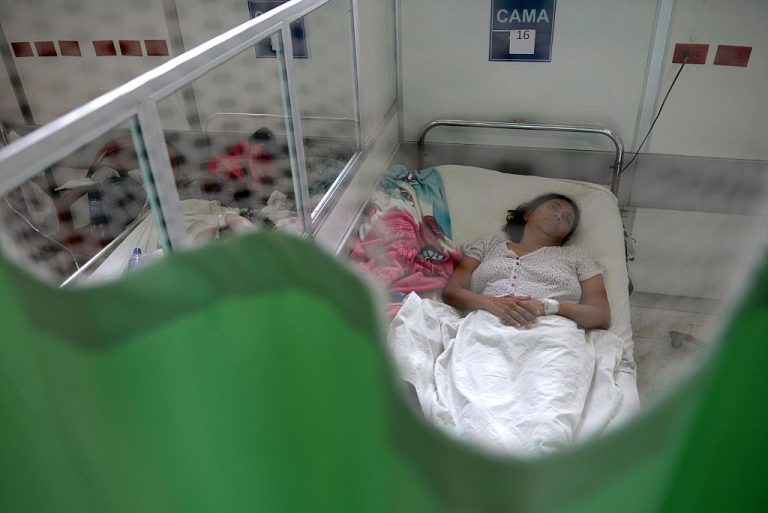On Aug. 10, the CDC published an update regarding reports of adverse events after vaccination with Coronavirus Disease 2019 (COVID-19) vaccines. As of July 22, 187 million people in America have received at least one dose of a COVID-19 vaccine.
The Advisory Committee on Immunization Practices (ACIP) met on July 22 to review benefit-risk analyses, and concluded that the benefits outweighed the risks. However, the agency recommended “Information about rare adverse events should be disseminated to providers, vaccine recipients, and the public.”
The document states, “Rare serious adverse events have been reported after COVID-19 vaccination, including Guillain-Barré syndrome (GBS) and thrombosis with thrombocytopenia syndrome (TTS) after Janssen COVID-19 vaccination and myocarditis after mRNA (Pfizer-BioNTech and Moderna) COVID-19 vaccination.”
Guillain-Barré syndrome
The CDC defines Guillain-Barré syndrome (GBS) as “a rare disorder where the body’s immune system damages nerve cells, causing muscle weakness and sometimes paralysis,” usually after infection with a virus or bacteria. While most will make a full recovery, some will “have permanent nerve damage.”
On July 12, the U.S. Food and Drug Administration (FDA) had added a warning to the Emergency Use Authorization (EUA) fact sheets after “reports of a more than expected number of GBS cases to the Vaccine Adverse Events Reporting System (VAERS) after Janssen COVID-19 vaccination.” VAERS is a database run by the CDC and FDA, which acts as a “national early warning system to detect possible safety problems” with U.S. vaccines.
Success
You are now signed up for our newsletter
Success
Check your email to complete sign up
The CDC says “Patients might require intensive care unit (ICU) admission and ventilator support; although most patients recover, GBS can result in permanent paralysis or death.” There have been “100 reports of GBS after Janssen COVID-19 vaccination were received during February 27–June 30, 2021.”
According to a 2011 report by Harvard Pilgrim Health Care, Inc. for the U.S. Department of Health and Human Services (HHS), “Although 25% of ambulatory patients experience an adverse drug event, less than 0.3% of all adverse drug events and 1-13% of serious events are reported to the Food and Drug Administration (FDA). Likewise, fewer than 1% of vaccine adverse events are reported.”
A search of the VAERS database using the publicly available CDC WONDER tool reveals that there have been 118 reported cases of GBS after J&J vaccination as of Aug. 10, with the actual number likely in the thousands. Furthermore, there are a total of 483 cases of GBS in VAERS as of Aug. 10, which implies that a significant portion of cases are being reported after Pfizer-BioNTech and Moderna mRNA vaccination. The CDC has not acknowledged GBS cases after inoculation with mRNA vaccines.
Blood and heart adverse events
Thrombosis with thrombocytopenia syndrome (TTS) is a condition in which blood clots form in the body, interfering with normal blood flow, and the body has low platelets, which are necessary to help the body stop bleeding. Reports after J&J inoculation have mostly occurred in adult women under 50 years old. TTS has also been linked to the AstraZeneca COVID-19 vaccine.
The CDC states, “Through July 8, 2021, 38 cases of TTS within 15 days of vaccination and reported to VAERS met the case definition… These 38 reports were confirmed by physician reviewers at CDC and FDA and reviewed with the Clinical Immunization Safety Assessment Project Investigators, who include hematologists. Four of these patients died.”
However, there have been 2,269 cases of thrombocytopenia, or low platelets in the blood, as of Aug. 10, if all three U.S. vaccines under EUA are taken into account. There are 2,440 reported cases of thrombosis, or clotting, from COVID-19 vaccines in the U.S.
While the physician reviewers determined that only a miniscule portion met their specific definition of TTS, the presence of thousands of other reports of low platelets and clots is a major anomaly that should spark further investigation. Due to severe underreporting of less than 1% of vaccine adverse events to the government, or less than 10% according to other sources, there are likely tens of thousands of unaddressed cases.
Additionally, according to the CDC, “Myocarditis is inflammation of the heart muscle, and pericarditis is inflammation of the lining outside the heart.” The article mentions “497 reports of myocarditis after the second mRNA COVID-19 vaccine dose were received for persons aged ≥18 years… There were no confirmed myocarditis-associated deaths.”
The VAERS database contains significantly more reports of myocarditis and pericarditis than mentioned in the CDC article. Using the CDC WONDER tool to search VAERS, as of Aug. 10, there have been 3,728 cases of myocarditis or pericarditis.
Furthermore, there are reports of 12,366 deaths, 5,236 heart attacks, 46,036 hospitalizations, 4,759 cases of anaphylaxis, and 4,044 cases of Bell’s Palsy that the CDC has yet to address as possible adverse events due to COVID-19 vaccines.
The number of reported VAERS deaths in the U.S. in 2021 alone, after COVID-19 vaccines were authorized for emergency use, is greater than the number of deaths after inoculation from all vaccines given from 1990 to 2020 combined.















